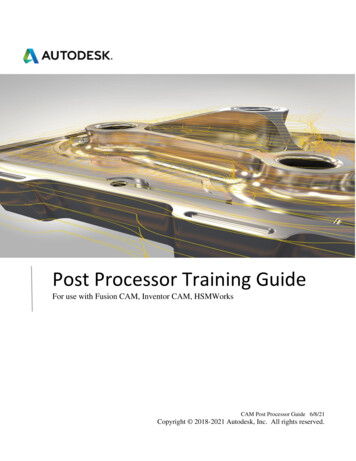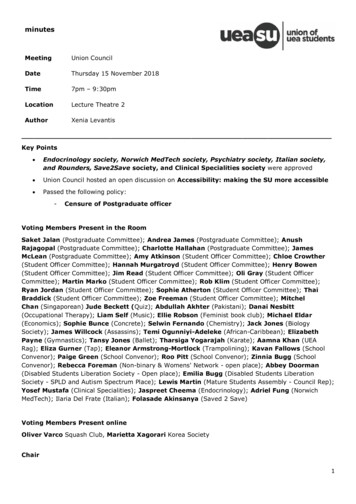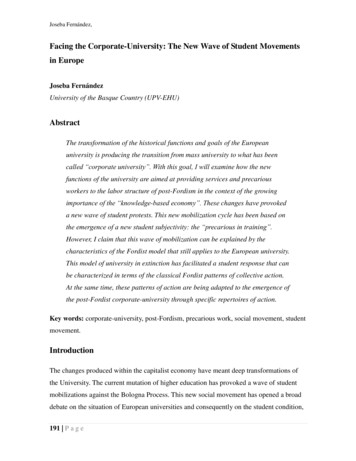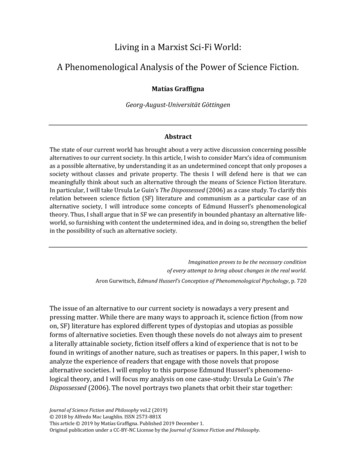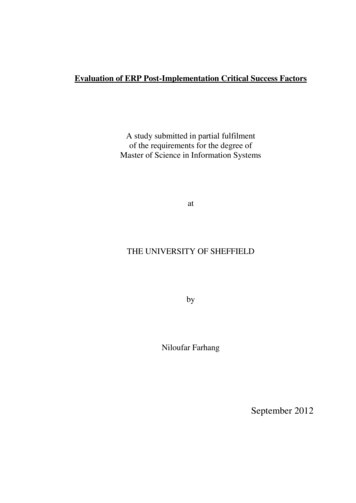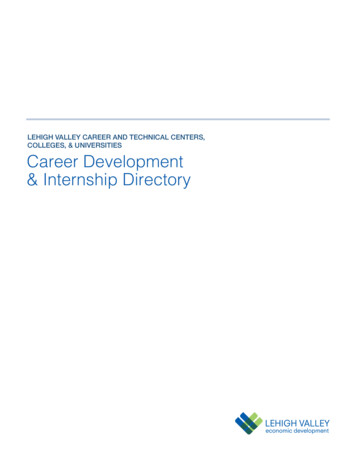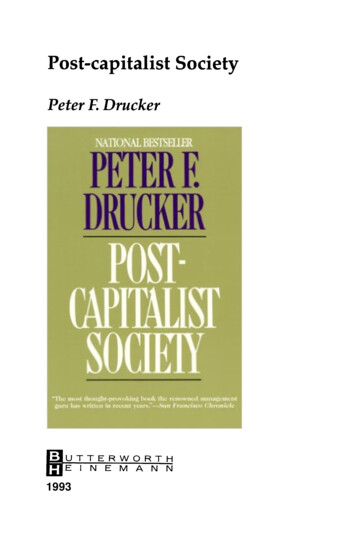
Transcription
Post-capitalist SocietyPeter F. DruckerIJIUTTERWORTHI I N E M A N N1993
AcknowledgementsThis book owes much to my long-time US editor and friend CassCanfield, Jr. He patiently endured countless proposals and outlines and encouraged me at every step. He carefully read mymanuscripts and made most helpful suggestions and criticisms.Thanks are due also to another long-time friend, MarionBuhagiar, who read and reviewed the book's first completed draftand helped greatly in revising and editing it. The biographer ofFrederick Winslow Taylor, Professor Ronald Greenwood of GMI,the General Motors Engineering and Management Institute inFlint, Michigan, critically read my comments on Taylor andScientific Management (in Chapter 1). The last section of Chapter6 owes a debt to the late Robert Greenleaf (especially to his wiselittle book, Servant Leadership (Paulist Press, 1977) and toLeadership as an Art by Max de Pree, (Doubleday, 1990), and to agood many discussions with these two friends and with Dr DavidAllan Hubbard, the President of Fuller Theological Seminary inPasadena, California. My assistant Holly Hauck over a long yearbravely coped with the vagaries of my handwriting. To all ofthem my warmest thanks.Claremont, CaliforniaThanksgiving Day 1992
Introduction: thetransformationEvery few hundred years in Western history there occurs a sharptransformation. We cross what in an earlier book (The New Realities,1989) I called a 'divide'. Within a few short decades, societyrearranges itself - its world view; its basic values; its social andpolitical structure; its arts; its key institutions. Fifty years laterthere is a new world. And the people born then cannot evenimagine the world in which their grandparents lived and intowhich their own parents were born.We are currently living in such a transformation. It is creatingthe Post-capitalist society. This is the subject of this book.One such transformation occurred in the thirteenth century when the European world, almost overnight, became centred inthe new city - with the emergence of city guilds as the new dominant social groups and with the revival of long-distance trade;with the Gothic, that eminently urban, indeed practically bourgeois, new architecture; with the new painting of the Sienese; withthe shift to Aristotle as the fountainhead of wisdom; with urbanuniversities replacing as the centres of culture the monasteries intheir rural isolation; with the new urban Orders, the Dominicansand Franciscans, emerging - as the carriers of religion, of learning,of spirituality; and within a few decades, with the shift from Latinto the vernacular and with Dante creating European literature.Two hundred years later, the next transformation took place inthe 60 years between Gutenberg's invention in 1455 of printingwith movable type, and with it of the printed book, and Luther'sProtestant Reformation in 1517. These were the decades of the
2Post-capitalist Societyblossoming of the Renaissance, peaking between 1470 and 1500 inFlorence and Venice; of the rediscovery of Antiquity; of theEuropean discovery of America; of the Spanish Infantry, the firststanding army since the Roman Legions; of the rediscovery ofanatomy and with it of scientific inquiry; and of the general adoption of Arabic numerals in the West. And again, no one living in1520 could have imagined the world in which one's grandparentshad lived and into which one's parents had been born.The next transformation began in 1776 - the year of theAmerican Revolution, of Watt's perfected steam engine and ofAdam Smith's Wealth of Nations. It came to a conclusion 40 yearslater, at Waterloo - 40 years during which all modern 'isms' wereborn. Capitalism, Communism and the Industrial Revolutionemerged during these decades. These years saw also the creation- in 1809 - of the modern university (Berlin) but also of universalschooling. These four decades brought the Emancipation of theJews - and by 1815 the Rothschilds had become the Great Powerovershadowing kings and princes. These 40 years produced, ineffect, a new European civilization. Again, no one living in 1820could imagine the world in which one's grandparents had livedand into which one's parents had been born.Our time, 200 years later, is again such a period of transformation.This time it is not, however, confined to Western society andWestern history. It is one of the fundamental changes that there isno longer a 'Western' history or indeed a 'Western' civilization.There is only world history and world civilization - but both areWesternized'. It is moot whether this present transformationbegan with the emergence of the first non-Western country, Japan,as a Great Economic Power - that is, around 1960 - or with thecomputer, that is, with information becoming central. My owncandidate would be the American GI Bill of Rights after WorldWar II which gave every returning American soldier the money toattend a university - something that would have made absolutelyno sense only 30 years earlier, at the end of World War I. The GIBill of Rights - and the enthusiastic response to it on the part ofAmerica's veterans - signalled the shift to the knowledge society.Future historians may well consider it the most important eventof the twentieth century.We are clearly still in the middle of this transformation indeed, if history is any guide it will not be completed until 2010
Introduction: the transformation 3or 2020. But it has already changed the political, economic, socialand moral landscape of the world. No one born in 1990 could possibly imagine the world in which one's grandparents (i.e. my generation) had grown up and in which one's own parents had beenborn.The first successful attempt to understand the transformationthat turned the Middle Ages and the Renaissance into the ModernWorld, the transformation that began in 1455, was not evenattempted until 50 years later: with the Commentaries ofCopernicus, written between 1510 and 1514; with Machiavelli'sPrince, written in 1513; with Michelangelo's synthesis and transcendence of all Renaissance art in the ceiling of the Sistine Chapelpainted between 1510 and 1512; and with the re-establishment ofthe Catholic Church at the Tridentine Council in the 1530s.The next transformation - the one that occurred 200 years agoand was ushered in by the American Revolution - was firstunderstood and analysed 60 years later, in the two volumes ofAlexis de Tocqueville's Democracy in America, published, respectively, in 1835 and 1840.We are far enough advanced into the new post-capitalist societyto review and revise the social, economic and political history ofthe Age of Capitalism and of the nation state. This book willtherefore take new looks at the period we are leaving behind and some of the things it sees from its new vantage point maycome as distinct surprises (they did to me).To foresee what the post-capitalist world itself will look like is,however, risky still. What new questions will arise and where thebig new issues will lie, we can, I believe, already discover withsome degree of probability In many areas we can also describewhat will not work. 'Answers' to most questions are still largelyhidden in the womb of the future. The one thing we can be sure ofis that the world that will emerge from the present rearrangementof values, of beliefs, of social and economic structures, of politicalconcepts and systems, indeed of world views, will be differentfrom anything anyone today imagines. In some areas - and especially in society and its structure - basic shifts have, however,already happened. That the new society will be both a non-socialist and a post-capitalist society is practically certain. And it is certain also that its primary resource will be knowledge. This alsomeans that it will have to be a society of organizations. Certain itis also that in politics we have already shifted from the 400 years
4Post-capitalist Societyof the sovereign nation state to a pluralism in which the nationstate will be one rather than the only unit of political integration.It will be one component - though still a key component - in whatI call the 'post-capitalist polity', a system in which transnational,regional, nation-state and local, indeed tribal, structures competeand co-exist.These things have already happened. They can therefore bedescribed. To do this is the purpose of this book.Post-capitalistsocietyand post-capitalistpolityOnly a few short decades ago everybody 'knew 7 that a post-capitalist society would surely be a Marxist one. Now we all knowthat a Marxist society is the one thing the next society is not goingto be. But most of us also know - or at least sense - that developed countries are moving out of anything that could be calledcapitalism. The market will surely remain the effective integratorof economic activity. But as a society the developed countries havealso already moved into post-capitalism. It is fast becoming a society of new 'classes' and with a new central resource as its core.Capitalist society was dominated by two social classes: the capitalists, who owned and controlled the means of production, andthe workers - Karl Marx's (1818-1883) 'proletarians', alienated,exploited, dependent. The proletarians first became the 'affluent'middle class as a result of the 'Productivity Revolution' - the revolution that began at the very time of Marx's death in 1883, andreached its climax in every developed country shortly after WorldWar II. Around 1950 the industrial worker - no longer a 'proletarian' but still 'labour' - seemed to dominate politics and society inevery developed country. But then, with the onset of the'Management Revolution' the blue-collar workers in manufacturing industry rapidly began to decline both in numbers and evenmore in power and status. By the year 2000 there will be no developed country where traditional workers making and movinggoods account for more than one-sixth or one-eighth of the workforce.The capitalist probably reached his peak even earlier - by theturn of the century, and surely no later than World War I. Sincethen no one has matched in power and visibility the likes of
Introduction: the transformation 5Morgan, Rockefeller, Carnegie or Ford in the United States;Siemens, Thysen, Rathenau, Krupp in Germany; Mond, Cunard,Lever, Vickers, Armstrong in England; de Wendel and Schneiderin France; or of the families that owned the great zaibatsu of Japan;Mitsubishi, Mitsui and Sumitomo. By World War II they had allbeen replaced by 'professional managers'* - the first result of theManagement Revolution. There are still a great many rich peoplearound, of course, and they are still prominent in the newspapers'society pages. But they have become 'celebrities'; economicallythey have almost ceased to matter. Even on the business pages allattention is being paid to 'hired hands', that is, to managers. Andsuch talk of money as there is, is about the 'excessive salaries' andbonuses of such hired hands who themselves own little or nothing.Instead of the old-line capitalist, in developed countries pension funds increasingly control the supply and allocation ofmoney. In the United States they owned in 1992 half of the sharecapital of the country's large businesses and held almost as muchof these companies' fixed debts. The beneficiary owners of thepension funds are, of course, the country's employees. IfSocialism is defined, as Marx defined it, as ownership of themeans of production by the employees, then the United States hasbecome the most 'socialist' country around - while still being themost 'capitalist' one as well. Pension funds are run by a newbreed of capitalists, the faceless, anonymous, salaried employees,the pension funds' investment analysts and portfolio managers.But equally important: the real and controlling resource and theabsolutely decisive 'factor of production' is now neither capital,nor land, nor labour. It is knowledge. Instead of capitalists andproletarians, the classes of the post-capitalist society are knowledge workers and service workers.The shift to the knowledgesocietyThe move to the post-capitalist society began shortly after WorldWar II. I first wrote of the 'employee society' even before 1950.tTen years later, around 1960,1 coined the terms 'knowledge work'* The best account, though limited to manufacturing in the United States, isAlfred D. Chandler's book The Visible Hand (Harvard University Press, 1977). e.g. in my book The New Society (1949).
6Post-capitalist Societyand 'knowledge worker'. And my 1969 book The Age ofDiscontinuity first talked of the 'society of organizations'. Thisbook is thus based on work done over 40 years. And most of itspolicy and action recommendations have been successfully tested.Only with the collapse of Marxism as an ideology and ofCommunism as a system* did it, however, become completelyclear that we have already moved into a new and different society.Only then did a book like this become possible: a book that is notprediction but description, a book that is not futuristic but calls foraction here and now.The bankruptcy - moral, political, economic - of Marxism andthe collapse of the Communist regimes were not 'The End ofHistory' (as a widely publicized 1989 articlet proclaimed). Even thestaunchest believers in the free market surely hesitate to hail its triumph as the Second Coming. But the events of 1989 and 1990 weremore than just the end of an era; they signified the end of one kind ofhistory. The collapse of Marxism and of Communism brought to aclose 250 years that were dominated by a secular religion - I havecalled it}: the belief in salvation by society. The first prophet of thissecular religion was Jean-Jacques Rousseau (1712-1778). TheMarxist Utopia was its ultimate distillation - and its apotheosis.The same forces which destroyed Marxism as an ideology andCommunism as a social system, are, however, also making capitalism obsolescent. For 250 years, from the second half of the eighteenth century on, capitalism was the dominant social reality. Forthe last hundred years Marxism was the dominant social ideology. Both are rapidly being superseded by a new and very different society.The new society - and it is already here - is a post-capitalist society. It surely, to say it again, will use the free market as the oneproven mechanism of economic integration. It will not be an 'anticapitalist society'. It will not even be a 'non-capitalist society'; theinstitutions of capitalism will survive though some, e.g. banks,may play quite different roles. But the centre of gravity in thepost-capitalist society - its structure; its social and economic* Both anticipated in a book of mine The New Realities - published in 1989 andwritten in 1987, several years ahead of the actual events. 'The End of History' by Francis Fukayama, The National Interest, Summer1989.t in my book The New Realities (1989).
Introduction: the transformation 7dynamics; its social classes and its social problems - are differentfrom those that dominated the last 250 years, and defined theissues around which political parties, social groups, social valuesystems, and personal and political commitments crystallized.The basic economic resource - 'the means of production' to usethe economist's term - is no longer capital, nor natural resources(the economist's 'land'), nor 'labour'. It is and will be knowledge. Thecentral wealth-creating activities will be neither the allocation ofcapital to productive uses nor 'labour' - the two poles of nineteenth- and twentieth-century economic theory, whether Classical,Marxist, Keynesian or Neo-Classical. Value is now created by 'productivity' and 'innovation', both applications of knowledge towork. The leading social groups of the knowledge society will be'knowledge workers' - knowledge executives who know how toallocate knowledge to productive use - just as the capitalists knewhow to allocate capital to productive use; knowledge professionals; knowledge employees. Practically all these knowledge peoplewill be employed in organizations. Yet unlike the employees undercapitalism they own both the 'means of production' and the 'toolsof production' - the former through their pension funds which arerapidly emerging in all developed countries as the only real owners, the latter because knowledge workers own their knowledgeand can take it with them wherever they go. The economic challenge of the post-capitalist society will therefore be the productivity of knowledge work and knowledge worker.The social challenge of the post-capitalist society will, however,be the dignity of the second class in post-capitalist society: the service workers. Service workers, as a rule, lack the necessary education to be knowledge workers. And in every country, even themost highly advanced ones, they will constitute a majority.The post-capitalist society will be divided by a new dichotomyof values and of aesthetic perceptions. It will not be the 'TwoCultures' - the literary culture and the scientific culture - of whichthe English novelist, scientist, and government administrator C. P.Snow (1905-1980) wrote in his 1959 book The Two Cultures and theScientific Revolution - though that split is real enough. Thedichotomy will be between 'intellectuals' and 'managers', the former concerned with words and ideas, the latter with people andwork. To transcend this dichotomy in a new synthesis will be acentral philosophical and educational challenge for the postcapitalist society.
8Post-capitalist SocietyOutflanking the nation state?The late 1980s and early 1990s also marked the end of another era,another 'kind of history'. If the fall of the Berlin Wall in 1989 wasthe climactic event that symbolized the fall of Marxism andCommunism, the transnational coalition against Iraq's invasion ofKuwait in February 1991 was the climactic event that marked theend of the 400 years of history in which the sovereign nation statewas the main (and often the only) actor on the political stage.Future historians will surely rank February 1991 among the 'bigdates'. There is no precedent for such transnational actions. At noearlier occasion did nations - without a single dissenter of consequence (and almost without dissent altogether) - put the commoninterest of the world community in putting down terrorism aheadof their own national sentiments, and, in many cases, ahead evenof their own national interest. There is no precedent for the all butuniversal realization that terrorism is not a matter of 'politics' tobe left to individual national governments. It requires nonnational, transnational action.It is widely believed, especially among Liberals in the UnitedStates, that the 1991 war against Iraq was mounted to protect theWest's oil supply. Nothing could be further from the truth. Iraqicontrol of the oil wells of Kuwait - and those of Saudi Arabia aswell - would have been very much in the West's economic interest.It would have meant much cheaper oil. For while Kuwait and SaudiArabia have practically no native populations and therefore nourgent need for immediate petroleum income, Iraq is heavilyoverpopulated, and, except for petroleum, almost totally withoutnatural resources. It therefore needs to sell as much oil as it possibly can whereas Kuwait and Saudi Arabia are primarily interested in keeping oil prices high and that means keepingproduction low. This, by the way, explains why the United Statesheavily supported Saddam Hussein's regime in Iraq, even beforethe Iraq-Iran war and why it continued to do so until the verymoment when Saddam attacked Kuwait and thus indulged in anovert terrorist act. It also explains, I suspect, why Saddam miscalculated; he must have been convinced that the United Stateswould let him get away with flagrant aggression in order toensure low petroleum prices. And everyone I know in a majorpetroleum company was sure when Iraq invaded Kuwait that the
Introduction: the transformation 9US government would not do anything but make a few disapproving noises.In the 400 years since the French lawyer-politician Jean Bodin(1530-1596) invented it (in his 1576 book Six Livres de laRépublique) the nation state had become the one organ of politicalpower, internally and externally. And since the FrenchRevolution, i.e. in the last 200 years, it also became the carrier ofthe secular religion, the belief in salvation by society. In factTotalitarianism - Communist as well as Nazi - was the ultimatedistillation and apotheosis of the doctrine of the sovereign nationstate as the one and only organ of power.Political theory and constitutional law still know only the sovereign state. And in the last hundred years it has steadily becomemore powerful and more dominant. It has mutated into the'Megastate'. It is the one political structure we so far understand,are familiar with, and know how to build out of prefabricated andstandardized parts, an executive, a legislature, courts, a diplomatic service, national armies, and so on. Every one of the nearly200 new countries that have been carved out of the former colonial empires since the end of World War II has been set up as asovereign nation state. And this is what every one of the variousparts of the last of the colonial empires, the Soviet empire, aspiresto become.And yet for 40 years, that is, since the end of World War II, thesovereign nation state has steadily been losing its position as theone organ of power. Internally, developed countries are fastbecoming pluralist societies of organizations. Externally, somegovernmental functions are becoming transnational, othersregional (i.e. in the European Community), others are beingtribalized.The nation state is not going to 'wither away'. It may remainthe most powerful political organ around for a long time to come.But it will no longer be the indispensable one. It will increasinglyshare power with other organs, other institutions, other policymakers. What is to remain the domain of the nation state? What isto be carried out within the state by autonomous institutions?What is to be 'supernational·? What is to be 'transnational·? Whatis to be 'separate and local·? These questions will be central political issues for decades to come. In its specifics, the outcome isquite unpredictable. But the political order will look differentfrom the political order of the last centuries in which the players
10 Post-capitalist Societydiffered in size, wealth, constitutional arrangements and politicalcreed but were uniform as nation states, each sovereign within itsterritory, and each defined by its territory. We are moving - wehave indeed already moved - into post-capitalist polity.The last of what might be called the 'pre-modern' philosophers,Gottfried Leibnitz (1646-1716), spent much of his life in a futileattempt to restore the unity of Christendom. His motivation wasnot the fear of religious wars between Catholics and Protestantsor between different Protestant sects - that danger was alreadypast when Leibnitz was born. He feared that without a commonbelief in a supernatural God, secular religions would emerge. Anda secular religion, he was convinced would, almost by definition,have to be a tyranny and suppress the freedom of the person.A century later Jean-Jacques Rousseau confirmed Leibnitz'sfears. Rousseau asserted that society could and should control theindividual human being. It could and should create a 'New Adam'.It could and should create universal human perfection. But it alsocould and should subordinate the individual to the impersonal,super-personal volonté générale (the general will) - what Marxistslater came to call the 'objective laws of history'. Since the FrenchRevolution Salvation by Society gradually became the dominantcreed at first in the West, and since World War II worldwide.However much it pretends to be 'anti-religious', it is a religiousfaith. The means are, of course, non-spiritual: banning alcohol;killing all Jews; universal psychoanalysis; abolition of private property. The goal, however, is religious: establishing the Kingdom ofGod on Earth through creating the 'New Man'.For more than a hundred years the most powerful and the mostpervasive secular creed promising salvation through society wasMarxism. The religious promise of Marxism far more than its convoluted ideology and its increasingly unrealistic economics constituted its tremendous appeal, especially to intellectuals. Therewere many reasons, for instance, for Eastern Jews to accept anideology that promised an end to their persecution and their discrimination in the Russia of the Tsars or in Romania. But the mostpowerful appeal for them was Marxism's promise of an earthlyparadise, that is, Marxism's appeal as a secular religion.Communism collapsed as an economic system. Instead of creating wealth it created misery. Instead of creating economic qualityit created a nomenklatura of functionaries enjoying unprecedentedeconomic privileges. But as a creed, Marxism collapsed because it
Introduction: the transformation 11did not create the 'New Man'. Instead it brought out and strengthened all the worst in the 'Old Adam': corruption, greed and lustfor power; envy and mutual distrust; petty tyranny and secretiveness; lying, stealing, denunciation and, above all, cynicism.Communism, the system, had its heroes. But Marxism, the creed,did not have a single saint.The human being may well be beyond redemption. The Latinpoet may have been right: human nature always sneaks inthrough the back door no matter how many times the pitchforktosses it out the front door. Maybe the cynics are right who assertthat there is no virtue, no goodness, no selflessness, only selfinterest and hypocrisy (though there are enough witnesses to thecontrary, as I remind myself in my darkest hours).But surely the collapse of Marxism as a creed signifies the end ofthe belief in Salvation by Society. What will emerge we cannot know- we can only hope and pray. Perhaps nothing beyond stoic resignation? Perhaps a rebirth of traditional religion addressing itself to theneeds and challenges of the person in the knowledge society? Theexplosive growth of what I call 'pastoral' Christian churches inAmerica - Protestant, Catholic, Non-Denominational - might be aportent. But so might be the resurgence of Fundamentalist Islam.For the young people in the Moslem world who now so ferventlyembrace Islamic Fundamentalism would, 40 years ago, have beenequally fervent Marxists. Or will there be new religions?What is unlikely to happen is easier to forecast than what islikely to happen. We will not see the rejection of material valuesand of technology - the 'Return to the Middle Ages' - which aJapanese writer, Taichi Sakaya (born 1935), predicted in aJapanese best-seller of the mid-1980s (published in English in 1991by Kodansha International, New York-Tokyo-London, under thetitle The Knowledge-Value Revolution). The worldwide spread ofinformation and of technology is certain to make this impossible.(Apart from the fact that Mr Sakaya's thesis rests on the nineteenth-century - and long disproven - belief that the Middle Agesspurned material goods. Alas, they lusted for them. They wereobsessed with possessions and greedy beyond belief. There issubstance to the old Marxist gibe that the Crusades were thebiggest shopping trip ever. The Middle Ages were poor notbecause they chose to be poor. The Moslem conquest of theHellenistic world and of the Mediterranean had cut off theiraccess to antiquity's wealth producers.)
12 Post-capitalist SocietyStill, redemption, self-renewal, spiritual growth, goodness andvirtue - the 'New Man' to use the traditional term - are likely tobe seen as existential rather than as a social goal and political prescription. The end of the belief in salvation by society surelymarks an inward turning. It makes renewed emphasis on the individual, the person. It may even lead - at least we can so hope - toa return to individual responsibility.The ThirdWorldThis book focuses on the developed countries - on Europe, on theUnited States and Canada, on Japan and the newly developedcountries on the mainland of Asia, rather than on the developingcountriesless-developedwouldinthe Thirdbe folly.of byofthethe7 . useless periodimportant.I live,considerofaftertransiThattheall,tion comeshousethree-quarters.to an end - ButaroundI also2010consideror 2020it- highlythe ThirdprobableWorld thatwillwithin the next decade or two there will be new and startling'economic miracles', in which poor, backward, Third-World countries transformeconomicpowers.themselves,It is even virtuallypossible overnight,that there willinto befast-growthfar moresuch transformations than there have been in the last 40 years,that theAllis, sinceelementswe firstfor beganrapid toeconomictalk aboutgrowth'economicare presentdevelopment'.in thecoastal,theket;learning;northa highlyurbanized,toanCantoneducatedold entrepreneurialareasin eChinatremendousa huge- closefromdomestictiesTsientsinrespectto martheforin'Overseas Chinese' in Singapore, Hong Kong and Taiwan, withaccess to people.edgeableentrepreneurialtheir capital,growthAll dnetworksandineconomicandan a'smay alreadylarger countriesbe in the'take-off stage. And Brazil might surprise everybody by thespeed ofMexico'sfollowits turnaroundrecent exampleonce it mustersand abandonthe politicalthe failedcourage(andtoindeed suicidal) policies into which it plunged after 1970. No one
Introduction: the transformation 13can possibly foretell what surprises the former Communist countries of Eastern Europe might produce.But the developed countries also have a tremendous s
6 owes a debt to the late Robert Greenleaf (especially to his wise little book, Servant Leadership (Paulist Press, 1977) and to . Leadership as an Art. by Max de Pree, (Doubleday, 1990), and to a good many discussions with these two friends and with Dr David Allan Hubbard, the President of Fuller Theological Seminary in Pasadena, California.
